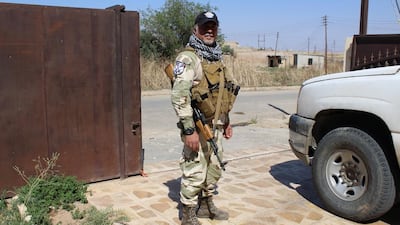ERBIL // When ISIL attacked the Christian town of Qaraqosh last year, it was only the latest in a series of disasters to befall one of Iraq’s oldest communities.
Flush with success after chasing the Iraqi army out of Mosul, the group quickly advanced into the nearby Nineveh plains, forcing an estimated 200,000 Assyrian Christians to flee, according to the NGO Reach Initiative.
Most have sought shelter in refugee camps in the autonomous Kurdish region that borders Nineveh province, where they are now pondering their future in a country they feel does not want them.
Some are forming militias with the intent to reclaim territory and form a safe haven.
Christians suspect widespread collaboration between their Arab neighbours and ISIL, and almost all those displaced believe their houses have been looted by their former neighbours. Many say they know of Arabs that have joined the militants.
After being abandoned by their government and betrayed by their neighbours, the rise of ISIL marked the culmination of over a decade of violent persecution of Christians in Iraq.
“We don’t want to leave the country that we lived in all our lives, where we enjoyed life and our religion. But we need a secure place to live,” says Batool Airyagoos, who fled Qaraqosh, the largest Christian town in Nineveh, before it fell to ISIL last August. She now lives in a refugee camp in the Christian quarter of Erbil, the capital of the Kurdistan Regional Government (KRG).
Christians have fallen victim to extremism in Iraq since the fall of Saddam Hussein. Sectarian tensions that arose in the aftermath of the second Gulf War unleashed a wave of violence against the minority, and many have already emigrated.
The US state department has estimated that one million Christians lived in Iraq when Saddam was toppled in 2003. Ten years later, Iraqi Christian church leaders said the number was halved, after hundreds of thousands of Christians left Iraq.
Most of the Christians in Nineveh are descendants of the Assyrians whose empire spread across Iraq over 3,000 years ago.
With roots this deep, they feel a strong connection to their land, and are determined to fight for their future in Iraq.
“This area belongs to our people and we have been here for thousands of years,” says Athra Kado, an Assyrian Christian who joined a militia unit last September.
Iraq’s Christians are represented by various political parties, some of which have their own militias. Large parts of Nineveh is disputed territory, with both the KRG and the central government in Baghdad laying claim to the Christian heartlands.
Most of the militiamen envisage an autonomous region for Nineveh’s Christian areas, be it under Kurdish or Iraqi jurisdiction. Having lost faith in both the Iraqi army and the Peshmerga, they are determined to safeguard their lands against future threats.
“The idea is to help to retake our towns and villages, and after that to hold our ground. We don’t want a repeat of what happened in Mosul with the Iraqi army, or in Nineveh with the Peshmerga. We trusted the forces in Iraq but they did not stay and fight, they did not even spend one bullet,” said Mr Kado, who is part the Nineveh Plains Protection Unit (NPU) militia.
The Peshmerga withdrew from parts of Nineveh, and abandoned Qaraqosh last August after more than a month of fighting.
The NPU hopes to become part of the National Guard that Baghdad seeks to raise, thus getting access to weapons and funding without being subject to direct control by either the KRG or the central government.
As the national guard units would fall under the control of Ninevah’s provincial government, the NPU would be getting access to weapons and funding without being subject to direct control by either the KRG or the central government.
As a result, the militia has received little help from the Peshmerga, and military training came to halt after the first batch of 500 volunteers, says Mr Kado.With the parliament in Baghdad stalling on the necessary legislation, the National Guard has yet to be formed, and the NPU has received neither weapons nor financial assistance from the central government.
Funding from within the community, or from Christian groups abroad, has not been to equip the men and keep them in the field.
Other groups are closer to the KRG. Albert Kisso, the commander of a small militia called Dwekh Nawsha, says that relations with the Peshmerga are good, even if his group has received neither weapons nor training from the Kurds.
Dwekh Nawsha, which translates from the Syriac language into “one who sacrifices”, is made up of less than 70 volunteers, including a small number of foreign fighters. The militia acts as a reserve that gets called in when ISIL mounts an attack.
Mr Kisso believes that an autonomous Christian region would best be part of the KRG, which has a better track record protecting minorities than the Iraqi government.
“We would like be part of Kurdistan as an independent region. In this area its better to live with Kurds. Because the experience we had with the Arabs was not pretty,” he said.
foreign.desk@thenational.ae

